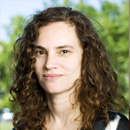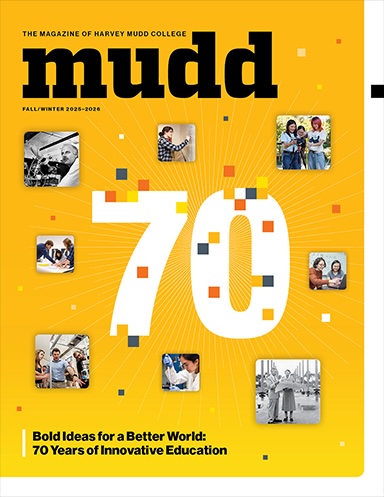Mayeri Brings Ape Culture Discussion to Berlin
June 26, 2015
What would a cinema made for audiences of great apes look like? Associate Professor of Media Studies Rachel Mayeri was invited to Germany to share her artistic perspective on the subject. She will lead a guided tour at Haus der Kulturen der Welt (House of World Cultures) in Berlin on June 28, showing her experiments making films for chimpanzees at the Edinburgh Zoo and questioning the meanings of apes in our culture.
“I was invited to participate as a juror and an artist in a workshop called ‘Synapse Curatorial Network’ for curators on bridging art and science, specifically on the topic of human-animal relations,” says Mayeri. Hila Peleg and Anselm Franke curated the show.
The workshop is organized by Anselm Franke, and curator Chus Martinez, Cord Riechelmann and artist Coco Fusco will also participate. “It’s very exciting to be in such great company, in a dynamic city and institution (Haus der Kulturen der Welt), on a topic I have been working on for many years,” Mayeri says.
Her visit to Berlin follows an invitation to teach a workshop on “How to Act Like an Animal” at the Corner College in Zurich, an independent artists’ space.
Mayeri’s Harvey Mudd College courses in humanities, art and media studies are intended to promote critical thinking and creative expression (for example, two of her courses are Animal Media Studies and People and Other Animals). Her teaching and artwork situate media at the center of culture and politics and serve as a conduit for personal expression. As an artist, she often makes videos about the intersection of science and art.
Her videos, installations and writing projects explore topics ranging from the history of special effects to the human animal. For several years, she has been working on a series of experimental videos exploring the primate continuum titled “Primate Cinema.” Commissioned by The Arts Catalyst, the project received financial support from the Arts Council England and the Institute for Advanced Studies at Aix-Marseille University, a Wellcome Trust Arts Award and a research grant from Harvey Mudd.
Primate Cinema: Apes as Family is an 11-minute film made for chimpanzees, shown to a chimpanzee audience. Mayeri created the drama portion of the project in Los Angeles with seven actors dressed as chimpanzees. It depicts the story of a young female chimp that befriends a group of outsiders.
She filmed the chimps’ reactions during a yearlong project at the Edinburgh Zoo, in which chimpanzees voluntarily watched the drama on a television screen placed in their enclosure. Mayeri worked with comparative psychologist Sarah-Jane Vick to observe the chimps’ responses and explore issues of cognition and communication in research primates. Although giving chimps a television to watch is a common enrichment practice, Primate Cinema is the first effort to script a drama specifically for their viewing.
The project premiered as an art installation at the 2011 Abandon Normal Devices Festival in Liverpool, which celebrates new cinema, digital culture and art. A 12-minute single-channel video version of the project was selected in 2013 for Sundance Film Festival, German festival Berlinale, True/False Film Fest and International Festival of New Media Art and Video Transitio_MX. A 22-minute two-channel video installation version also premiered at Abandon Normal Devices. In addition, it was featured at the Edinburgh Art Festival and won a prize for hybrid art at Ars Electronica.
Mayeri’s work Primate Cinema: Baboons as Friends (2007)—a reenactment of a baboon social drama with human actors—produced in collaboration with primatologist Deborah Forster, received a semifinalist honor for the International Science & Engineering Visualization Challenge (sponsored by the National Science Foundation and the journal Science) and showed at the Museum of Contemporary Art in Denmark. As guest curator at the Museum of Jurassic Technology, Mayeri contributed to an exhibit on the history of special effects, Miracles and Disasters in Renaissance and Baroque Theater Mechanics.
Mayeri also produced the video Stories From the Genome, which placed contemporary gene science within a history of speculative theories of reproduction. She has distributed her work along with many other videos by artists and scientists as a touring DVD video show and website titled Soft Science. The project is another way to elicit conversation and bridge the disciplines of scientists and artists.
